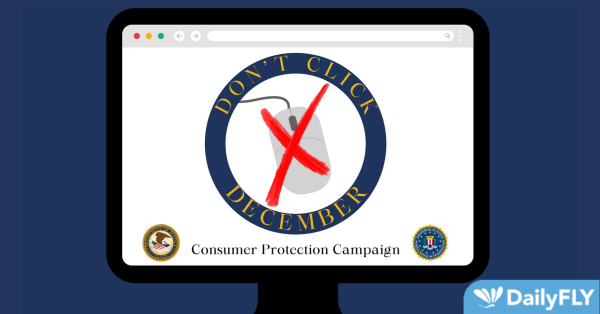BOISE – During the holiday season, online criminals increasingly target Idahoans through online scams and fraud schemes. Today, U.S. Attorney Josh Hurwit, along with the FBI, the Idaho State Police, the Ada County Prosecutor’s Office, the Ada County Sheriff’s Office, the Boise Police Department, the Meridian Police Department, and the Garden City Police Department, released a third PSA as part of their joint “Don’t Click December” Consumer Protection Campaign. The Canyon County Sheriff’s Office, Idaho Attorney General’s Consumer Protection Division, AARP Idaho, and the Better Business Bureau also participated in the announcement.
The campaign advises members of the public to exercise skepticism and caution when receiving unsolicited online, email, pop-up, or text communications from unknown or unverified sources. If there is any doubt about a link, message, or attachment, law enforcement cautions: “don’t click it.”
In the third PSA, available here, Ada County Prosecuting Attorney Jan Bennetts, Meridian Police Chief Tracy Basterrechea, and U.S. Attorney Hurwit warn the public about the “Account subscription” scam and explain some of the ways in which individuals can protect themselves.
In this scam, you could receive an email or text message indicating a subscription has been renewed for another year. The message encourages you to click a link to verify or to receive a receipt for the subscription. The criminals on the other end could be posing as a subscription service you participate in or as one you do not actively have. If you receive an unsolicited message asking you to click a subscription link you did not sign up for, don’t click it. If it appears to be a subscription you have signed up for, check the email address to verify it is from that service. Report as spam and delete any messages about auto-renewals from companies you don’t have subscriptions with.
As part of the ongoing campaign, one final PSA is planned to be released next week. These series of PSAs being released in the weeks leading up to Christmas is an effort to alert the public to other common online fraud schemes that Idaho law enforcement has seen affect Idahoans.
Unfortunately, these are not the only schemes affecting the public, and new schemes arise all the time. Law enforcement hopes that the “Don’t Click December” Consumer Protection Campaign will raise public awareness and encourage individuals to talk to their friends and relatives about not clicking suspicious links, texts, messages, pop-ups, or attachments.
“We have witnessed many Idahoans lose their hard-earned money or their entire retirement savings to online scams. And, sadly, this type of crime tends to spike during the holiday season,” said U.S. Attorney Hurwit. “But, together, we can reduce the risks by talking with each other about how to avoid such scams, and I’m grateful to our law enforcement partners and the AARP for joining us in the Don’t Click December campaign. We also encourage Idahoans to report any scams as soon as possible so that law enforcement can investigate and we can bring these vicious online criminals to justice.”
“We can all play a part in preventing scammers from targeting their next victim in our communities,” said Ada County Prosecutor Jan Bennetts. “If you do find yourself the victim of a scam, contact local law enforcement. My office works closely with our law enforcement partners to hold offenders accountable for victimizing people through scams.”
“While the partnerships between our state and federal partners are vital, it is the partnerships with our community members that have the most impact on these types of crimes,” said Meridian Police Chief Tracy Basterrechea.
The U.S. Attorney’s Office and its law enforcement partners recognize that we all must work to eliminate the stigma individuals may experience if they are victimized. There is no shame to falling victim to an online scheme, which are often designed by professional criminals, sophisticated, and tested repeatedly across the country.
For this reason, the “Don’t Click December” Consumer Protection Campaign also publicizes ways to report scams and incidents of fraud to the FBI and local law enforcement.
To learn more about these and other scams targeting Americans visit FBI.gov, and if you believe you are the victim of a scam, take action by reporting it to FBI’s Internet Crime Complaint Center at IC3.gov or by contacting your local law enforcement agency.

















